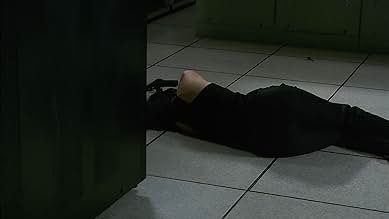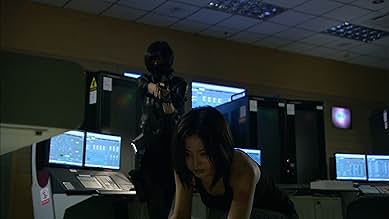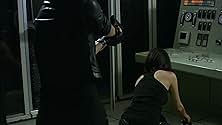Le National Security Service (NSS) est une agence secrète sud-coréenne qui lutte contre une organisation terroriste secrète, appelée IRIS.Le National Security Service (NSS) est une agence secrète sud-coréenne qui lutte contre une organisation terroriste secrète, appelée IRIS.Le National Security Service (NSS) est une agence secrète sud-coréenne qui lutte contre une organisation terroriste secrète, appelée IRIS.
- Récompenses
- 13 victoires et 20 nominations au total
Parcourir les épisodes
Avis à la une
This is a review of season one. The story line is fast paced and keeps your interest with tension. The production values are better than average for a Korean TV series, with the exception of the then, trendy, camera jerkiness which is horrible at times. Don't expect the production values to be as good as a movie.
There are the typical plot holes, but the show moves fast enough you can mostly ignore them. It is amazing to me that still, in 2020, most Korean shows never admit the ability to track a cell phone for location or recent calls after a bad guy or phone number has been identified. Regardless, I didn't mark this 2009 show down for that omission because my review is in comparison with other Asian dramas.
The show is well written enough that I couldn't always tell what was going to happen next, which I really enjoyed. Most shows follow pretty standard plot lines and this one follows a common overall plot arch, but the details were often difficult to predict, especially early in the show. Later in the show it becomes more formulaic.
The main characters aren't the best actors in the world, but they had chemistry with each other and with others, so that worked well.
SPOILER ALERT! I have to admit that I was disappointed in the tragic ending which I assumed was a vehicle to pull the female lead back into the spy agency. But, turns out that is not the case. So, just another Asian drama with a tragic ending.
I am usually very analytical (an engineer by education), but I generally want my shows to lift me up at the end, so that is entirely emotional and I did not enjoy the ending.
I just want to mention that Season Two is mostly new characters, weaker writing and weaker production values. It starts roughly 3 years after season one.
There are the typical plot holes, but the show moves fast enough you can mostly ignore them. It is amazing to me that still, in 2020, most Korean shows never admit the ability to track a cell phone for location or recent calls after a bad guy or phone number has been identified. Regardless, I didn't mark this 2009 show down for that omission because my review is in comparison with other Asian dramas.
The show is well written enough that I couldn't always tell what was going to happen next, which I really enjoyed. Most shows follow pretty standard plot lines and this one follows a common overall plot arch, but the details were often difficult to predict, especially early in the show. Later in the show it becomes more formulaic.
The main characters aren't the best actors in the world, but they had chemistry with each other and with others, so that worked well.
SPOILER ALERT! I have to admit that I was disappointed in the tragic ending which I assumed was a vehicle to pull the female lead back into the spy agency. But, turns out that is not the case. So, just another Asian drama with a tragic ending.
I am usually very analytical (an engineer by education), but I generally want my shows to lift me up at the end, so that is entirely emotional and I did not enjoy the ending.
I just want to mention that Season Two is mostly new characters, weaker writing and weaker production values. It starts roughly 3 years after season one.
Lee Byung-hun stars in one of my favourite movies "A bittersweet life" so I am always going to be generous with my rating in whatever he is in. As usual he puts in a great performance along with the whole cast and there are some really great action scenes which reflect the budget. My issue is the story does not flow as well as it should and the series concentrates on the big explosive scenes and not enough time on the development of the characters. Enjoyable action packed drama but could have been great.
... in it's heart-stopping action scenes, this drama is the closest cousin to Bond and Bourne I have seen on TV, with death-defying stunts, a huge budget and a massive body count. It also boasts a very physical turn from Byung-hun Lee as a highly believable super agent.
It is unfortunate that the plot wanders too far away from credibility on occasion to maintain the suspense.
The opening action sequence grabs you by the throat. Then there is a hiatus while the past history of the characters and their relationships are presented. Stick with it and once the action kicks back in it just does not let up.
It is unfortunate that the plot wanders too far away from credibility on occasion to maintain the suspense.
The opening action sequence grabs you by the throat. Then there is a hiatus while the past history of the characters and their relationships are presented. Stick with it and once the action kicks back in it just does not let up.
Iris was a serious South Korean spy thriller, with interesting plot twists, engaging performances, and several brutal betrayals, culminating in a finish that resulted in more than a few questions remaining unanswered. Promising to answer some of questions raised, Iris 2 is a show that had enormous shoes to fill, and unfortunately, its feet do not match the ambitious size of the original. Though one might imagine the sheer number of story-lines would make for a wealth of material, several aspects of the plot are tirelessly dragged out, obviously in the show's desperate attempt to reach 20 hour long episodes. Often predictable, with minimal character back-story, and a plot held together at the seams with sticky tape, the conflicting and often contradictory story-lines risk the production falling apart at a moment's notice.
However, if you look past the flaws, there are a number of notable reasons why this show deserves a look, not least of all, the poignancy that is efficaciously delivered by the writers, alongside the talented (and VERY attractive) actors. This is heightened by the amazing musical score, including the gorgeous song from Davichi. Several of the fight sequences are sure to impress, though at the same time, those familiar with the aforementioned original, or even Athena, will see a great number of similarities, alongside the addendum that their frenetic orchestration can make them hard to follow.
Furthermore, though some of the dialogue could be accused of immaturity, the chemistry and interactions between the characters prove to be engaging in themselves, the romantic and familial relationships being conceived with much emotion, while some of the witticisms are especially enjoyable. Though the show is often unrealistic, with characters severely injured in one episode, and running around during the next, alongside contradictions in the story-lines, and ideas that fail to be fleshed out, Iris 2 gradually finds its footing towards the end, resulting in an emotionally powerful and worth-while finale.
Jung Yoo-Gun (Jang Hyuk) and paramour Ji Soo-Yeon (Lee Da-Hae) work together for the NSS, under the authority of deputy-director Choi Min (Oh Yeon-Su), who is determined to rid the world of Iris. Her goals however, are continuously been undermined by the ambitious Kang Cheol-Hwan (Kam Il-Woo), who seeks control of the agency, though his allegiances are unclear. When an Iris cell, led by Rey (David McInnis), storms the NSS prison housing the agency's former director Baek San (Kim Young-Chul), and extricates him in an attempt to garner much needed information, it becomes clear that Baek San has an important role to play in the war against the terrorist group. When North Korean traitor Yoo Joong-Woo (Lee Beom-Soo), a man desperate to clear his name, is recruited by Iris agent Kim Yeon-Hwa (Lim Soo-Hyang) to assist with her mission, tensions between the North and the South begin to escalate, and threaten the inevitable commencement of a unification war.
With the sheer number of cast members, it is no surprise that some are provided significantly less screen time than others, with fellow NSS agents See Hyun-Woo (Yoon Doo-Joon) and Yoon-Shi Hyuk (Lee Joon), alongside Iris operative Park Tae-Hee (Yoon So-Yi), being difficult to associate with due to the significantly lacking characterization. Set over the course of more than a year, Iris 2 includes not only locations throughout South Korea, but internationally as well, which involve a car chase through the streets of Hungary, and a chase sequence on the ski slopes of Japan. When in its home nation, the shoot-outs often occur in warehouses, amongst other abandoned and condemned locations, which offer little in the way of uniqueness.
Moving on, it's a fact, in every production, the antagonist is defeated. However, what's most important is not only how, but what horrors they have in store for the heroes. In short, how impressive a villain are they? The monotonous repetition of failure that consumes the enemy organization with every turn they take however, only makes their defeat all the more inevitable. To add insult to injury, the enemy group, Iris, have no motive or agenda, and without a cause, the audience is unable to connect with them on any level. If ever a cause was mentioned, it must have been whispered, for this viewer certainly never heard it.
The lacking interest in the terrorist cell is heightened by the show's inability to continuously hold us in suspense. Even the threat of a third world war, despite the emotional performances by the actors, flat-lines in its ability to make us legitimately believe this may in fact come to fruition. However, where the show excels, is its ability to captivate the audience with its character relationships. Unlike American shows, that often drag out romances to the point of utter boredom, Iris 2 gives its viewers enough tension, poignancy, grief and hope, to keep us entrenched for the entirety of the season. Moreover, though antagonists are loathed by the audience at times, on other occasions, they are equally sympathetic. Although the acting could occasionally be accused of being a little too melodramatic, one cannot ever deny the potency, with more than a few moments having the capacity to bring a tear, or more.
In conclusion, Iris 2 is best watched in moderation, and despite the occasional complexity of the stories, the show is very easy to follow. Despite been an enjoyable experience, Iris 2 is not a show that will cause you to continuously reminisce over the story-lines or characters. The show's conclusion leaves the Iris franchise open for a sequel, with a number of plots left unresolved, and several character stories requiring a more definitive close, though whether a third installment will occur, remains to be seen.
However, if you look past the flaws, there are a number of notable reasons why this show deserves a look, not least of all, the poignancy that is efficaciously delivered by the writers, alongside the talented (and VERY attractive) actors. This is heightened by the amazing musical score, including the gorgeous song from Davichi. Several of the fight sequences are sure to impress, though at the same time, those familiar with the aforementioned original, or even Athena, will see a great number of similarities, alongside the addendum that their frenetic orchestration can make them hard to follow.
Furthermore, though some of the dialogue could be accused of immaturity, the chemistry and interactions between the characters prove to be engaging in themselves, the romantic and familial relationships being conceived with much emotion, while some of the witticisms are especially enjoyable. Though the show is often unrealistic, with characters severely injured in one episode, and running around during the next, alongside contradictions in the story-lines, and ideas that fail to be fleshed out, Iris 2 gradually finds its footing towards the end, resulting in an emotionally powerful and worth-while finale.
Jung Yoo-Gun (Jang Hyuk) and paramour Ji Soo-Yeon (Lee Da-Hae) work together for the NSS, under the authority of deputy-director Choi Min (Oh Yeon-Su), who is determined to rid the world of Iris. Her goals however, are continuously been undermined by the ambitious Kang Cheol-Hwan (Kam Il-Woo), who seeks control of the agency, though his allegiances are unclear. When an Iris cell, led by Rey (David McInnis), storms the NSS prison housing the agency's former director Baek San (Kim Young-Chul), and extricates him in an attempt to garner much needed information, it becomes clear that Baek San has an important role to play in the war against the terrorist group. When North Korean traitor Yoo Joong-Woo (Lee Beom-Soo), a man desperate to clear his name, is recruited by Iris agent Kim Yeon-Hwa (Lim Soo-Hyang) to assist with her mission, tensions between the North and the South begin to escalate, and threaten the inevitable commencement of a unification war.
With the sheer number of cast members, it is no surprise that some are provided significantly less screen time than others, with fellow NSS agents See Hyun-Woo (Yoon Doo-Joon) and Yoon-Shi Hyuk (Lee Joon), alongside Iris operative Park Tae-Hee (Yoon So-Yi), being difficult to associate with due to the significantly lacking characterization. Set over the course of more than a year, Iris 2 includes not only locations throughout South Korea, but internationally as well, which involve a car chase through the streets of Hungary, and a chase sequence on the ski slopes of Japan. When in its home nation, the shoot-outs often occur in warehouses, amongst other abandoned and condemned locations, which offer little in the way of uniqueness.
Moving on, it's a fact, in every production, the antagonist is defeated. However, what's most important is not only how, but what horrors they have in store for the heroes. In short, how impressive a villain are they? The monotonous repetition of failure that consumes the enemy organization with every turn they take however, only makes their defeat all the more inevitable. To add insult to injury, the enemy group, Iris, have no motive or agenda, and without a cause, the audience is unable to connect with them on any level. If ever a cause was mentioned, it must have been whispered, for this viewer certainly never heard it.
The lacking interest in the terrorist cell is heightened by the show's inability to continuously hold us in suspense. Even the threat of a third world war, despite the emotional performances by the actors, flat-lines in its ability to make us legitimately believe this may in fact come to fruition. However, where the show excels, is its ability to captivate the audience with its character relationships. Unlike American shows, that often drag out romances to the point of utter boredom, Iris 2 gives its viewers enough tension, poignancy, grief and hope, to keep us entrenched for the entirety of the season. Moreover, though antagonists are loathed by the audience at times, on other occasions, they are equally sympathetic. Although the acting could occasionally be accused of being a little too melodramatic, one cannot ever deny the potency, with more than a few moments having the capacity to bring a tear, or more.
In conclusion, Iris 2 is best watched in moderation, and despite the occasional complexity of the stories, the show is very easy to follow. Despite been an enjoyable experience, Iris 2 is not a show that will cause you to continuously reminisce over the story-lines or characters. The show's conclusion leaves the Iris franchise open for a sequel, with a number of plots left unresolved, and several character stories requiring a more definitive close, though whether a third installment will occur, remains to be seen.
NOTE: This review has been edited as of 10/08/18.
Iris is 20 episode Korean TV show that aired in 2009. It's your basic Korean melodramatic TV series format, only it's infused with a significant amount of action & intrigue. Iris 2 (Iris II, Iris; New Generation) is its second/follow up season, which was also 20 episodes, but it didn't air until 2013.
SPOILERS AHEAD!
I had originally written 2 separate reviews years ago for this show/series, because IMDB originally listed them as 2 different shows. Since then, IMDB has apparently merged the original Iris page and the Iris 2 page together, so I'll do my best to merge my two original reviews together here under one review for both "shows/seasons".
Iris (Season 1) was a unique show in Korea when it aired. The idea behind it, was to get some guys who like action/spy/intrigue flicks to also tune into a TV genre almost exclusively geared to attracting female viewers by nature. They spent a fortune making this show (by KTV standards at the time), and it shows; production values are through the roof, various exotic locales are visited, there's some terrific cinematography, blazing gunfights, action scenes, etc.
Viewers loved it immediately (as did I), and it's easy to see why; it's often a riveting television series that is hard to look away from! And, Judging by the show's super high nationwide ratings (nearly 40% of all Korean TV viewers were watching this show by the time it wrapped up), I'd say the producers accomplished their goal and then some. Iris was a massive success by KTV standards that soon spawned a spin-off show (Athena), a movie (which was just an edited version of the TV show), talks of a second season (which only rarely happens in this medium), and so forth.
The closest comparison to this show for western audiences is the American TV series "24", and that's a fair analogy, as they do share many similarities. Here's your story: Two marine friends get recruited by the NIS (basically the South Korean equivalent of the U.S. CIA/NSA). While there, they meet the primary love interest who is their section chief responsible for training them. The 2 friends quickly take to their new jobs as secret agents, and are soon deployed in the field. Things go wrong when they are sent on an important mission though, and they discover they're mere pawns in a much bigger picture.
After the botched mission by the 2 friends/leads, this show boils down to a matter of uncovering what everybody's motives are, who's working for whom, and trying to stop the world from blowing up. Along the way, there's your main love interest story line, the main friendship story line, and so forth.
What cannot be understated is that this show is, at its core, a soap opera. It's a high octane soap opera indeed, but a soap opera nonetheless. I've seen a ton of Korean melodrama shows/series over the years, some of which tried their best to have these "soap operas" reach an audience that includes EVERYBODY (males/females, Koreans/foreigners, action fans/love story fans, etc.), and this is one of those rare shows that actually accomplishes this fairly well.
Iris (Season 1) is very entertaining and highly watchable. I gave it 8 out of 10 stars in my initial rating, and I stand by that. As for Iris 2 (i.e. Season 2). Very disappointing for several reasons. I see some reviewers think it's better than the original, however they are wrong, and I'll now explain why: Iris 2 is greatly hampered by two overriding factors: 1) It's just more of the same with a weaker story and less prominent actors, and, 2) The show producers missed the window to capitalize on the popularity of the original show/1st season, by delaying its production for nearly 4 years.
Don't get me wrong, I like a lot of the actors/actresses in Season 2, and they performed well overall, but the story and writing is lacking in general compared to the first season. In addition, everything seems rushed and tacked on (and/or poorly thought out), in what appears to be a last ditch effort to just cobble something together to put on TV and bring this show/series to a close. Part of the problem is because there was a bunch of hemming and hawing FOREVER about how to write and budget for a new season, along with trying to negotiate and sign up much of the original cast (despite the fact that, SPOILERS, most of their characters died or "were disappeared" at the end of the original show), and so on. As a result, Iris season 2 turned out to be a hodgepodge mess that was just "too lacking, too little, too late".
There are a couple of cast members in Iris 2 that are back from the original, but they're mostly all supporting roles that are non-essential and/or are under-utilized. There's also several new tie-in characters related to characters from the 1st season, but none of these prior cast members or new "related characters" really fit well within the overall story. And, I cannot forgive the fact that they cast some English speaking dude as the main evil guy. No offense to him as an actor or person, and I understand they're trying to be more "globally receptive" by speaking English some, but this role should have been given to someone fluent in Korean; the resulting "forced" English dialogue between him and some of the Korean actors/actresses is often distracting, and prevents the Korean actors/actresses from acting at their best (since they have to use a foreign/second language in some crucial scenes with him).
Iris 2 (Iris, Season 2) is not very good when compared to its forerunner. I originally gave it 5 out of 10 stars, and I stand by that.
Bottom Line: 8 out of 10 stars (for Iris 1 ONLY). As for Iris 2, hmmm, watch Athena; Goddess of War instead!
Iris is 20 episode Korean TV show that aired in 2009. It's your basic Korean melodramatic TV series format, only it's infused with a significant amount of action & intrigue. Iris 2 (Iris II, Iris; New Generation) is its second/follow up season, which was also 20 episodes, but it didn't air until 2013.
SPOILERS AHEAD!
I had originally written 2 separate reviews years ago for this show/series, because IMDB originally listed them as 2 different shows. Since then, IMDB has apparently merged the original Iris page and the Iris 2 page together, so I'll do my best to merge my two original reviews together here under one review for both "shows/seasons".
Iris (Season 1) was a unique show in Korea when it aired. The idea behind it, was to get some guys who like action/spy/intrigue flicks to also tune into a TV genre almost exclusively geared to attracting female viewers by nature. They spent a fortune making this show (by KTV standards at the time), and it shows; production values are through the roof, various exotic locales are visited, there's some terrific cinematography, blazing gunfights, action scenes, etc.
Viewers loved it immediately (as did I), and it's easy to see why; it's often a riveting television series that is hard to look away from! And, Judging by the show's super high nationwide ratings (nearly 40% of all Korean TV viewers were watching this show by the time it wrapped up), I'd say the producers accomplished their goal and then some. Iris was a massive success by KTV standards that soon spawned a spin-off show (Athena), a movie (which was just an edited version of the TV show), talks of a second season (which only rarely happens in this medium), and so forth.
The closest comparison to this show for western audiences is the American TV series "24", and that's a fair analogy, as they do share many similarities. Here's your story: Two marine friends get recruited by the NIS (basically the South Korean equivalent of the U.S. CIA/NSA). While there, they meet the primary love interest who is their section chief responsible for training them. The 2 friends quickly take to their new jobs as secret agents, and are soon deployed in the field. Things go wrong when they are sent on an important mission though, and they discover they're mere pawns in a much bigger picture.
After the botched mission by the 2 friends/leads, this show boils down to a matter of uncovering what everybody's motives are, who's working for whom, and trying to stop the world from blowing up. Along the way, there's your main love interest story line, the main friendship story line, and so forth.
What cannot be understated is that this show is, at its core, a soap opera. It's a high octane soap opera indeed, but a soap opera nonetheless. I've seen a ton of Korean melodrama shows/series over the years, some of which tried their best to have these "soap operas" reach an audience that includes EVERYBODY (males/females, Koreans/foreigners, action fans/love story fans, etc.), and this is one of those rare shows that actually accomplishes this fairly well.
Iris (Season 1) is very entertaining and highly watchable. I gave it 8 out of 10 stars in my initial rating, and I stand by that. As for Iris 2 (i.e. Season 2). Very disappointing for several reasons. I see some reviewers think it's better than the original, however they are wrong, and I'll now explain why: Iris 2 is greatly hampered by two overriding factors: 1) It's just more of the same with a weaker story and less prominent actors, and, 2) The show producers missed the window to capitalize on the popularity of the original show/1st season, by delaying its production for nearly 4 years.
Don't get me wrong, I like a lot of the actors/actresses in Season 2, and they performed well overall, but the story and writing is lacking in general compared to the first season. In addition, everything seems rushed and tacked on (and/or poorly thought out), in what appears to be a last ditch effort to just cobble something together to put on TV and bring this show/series to a close. Part of the problem is because there was a bunch of hemming and hawing FOREVER about how to write and budget for a new season, along with trying to negotiate and sign up much of the original cast (despite the fact that, SPOILERS, most of their characters died or "were disappeared" at the end of the original show), and so on. As a result, Iris season 2 turned out to be a hodgepodge mess that was just "too lacking, too little, too late".
There are a couple of cast members in Iris 2 that are back from the original, but they're mostly all supporting roles that are non-essential and/or are under-utilized. There's also several new tie-in characters related to characters from the 1st season, but none of these prior cast members or new "related characters" really fit well within the overall story. And, I cannot forgive the fact that they cast some English speaking dude as the main evil guy. No offense to him as an actor or person, and I understand they're trying to be more "globally receptive" by speaking English some, but this role should have been given to someone fluent in Korean; the resulting "forced" English dialogue between him and some of the Korean actors/actresses is often distracting, and prevents the Korean actors/actresses from acting at their best (since they have to use a foreign/second language in some crucial scenes with him).
Iris 2 (Iris, Season 2) is not very good when compared to its forerunner. I originally gave it 5 out of 10 stars, and I stand by that.
Bottom Line: 8 out of 10 stars (for Iris 1 ONLY). As for Iris 2, hmmm, watch Athena; Goddess of War instead!
Le saviez-vous
- AnecdotesSeung Hyun Choi performed a song, titled "Hallelujah," along with his fellow BIGBANG group members G-Dragon (Ji-Yong Kwon) and Taeyang (Young-bae Dong), for this series.
- ConnexionsEdited into Airiseu: Deo mubi (2010)
- Bandes originalesHallelujah
Performed by Choi Seung-hyun featuring Ji-yong Kwon and Young-bae Dong
Courtesy of Taewon Entertainment and CJ E&M
Meilleurs choix
Connectez-vous pour évaluer et suivre la liste de favoris afin de recevoir des recommandations personnalisées
- How many seasons does Iris have?Alimenté par Alexa
Détails
- Durée1 heure
- Couleur
Contribuer à cette page
Suggérer une modification ou ajouter du contenu manquant
































